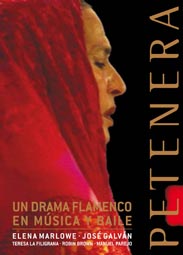It wasn’t until 2001, after an 11-year long separation from my father, that I decided to make a documentary film about his life as a flamenco artist. He had been a singer guitarist all his life – a minstrel from the past – and he had become a dancer in the mean time, which turned out to be part of my subject. In February 2002, when shooting of My Father, his Flamenco and I was completed, I had no intention of getting further involved professionally in music and dance films or live recordings, no matter how enriching and exciting the live recordings for the film had been for me. There was an ocean between the artistic environment I had grown up in and vowing my future to music and dance films – the Atlantic Ocean, in fact.
Almost 3 years later, as I was working in Barbados on a German TV feature as 1st AD, my father suggested I follow up directly after the shoot to record a live flamenco show he was producing in California with his wife Elena Marlowe and Seville's renowned maestro José Galván. I objected firmly, arguing with insurmountable financial consequences to expect, the bottomless pit that the post-production could become, and my doubts as to the economic potential of the product, not even knowing what kind of a product it was supposed to be. Moreover, the idea of flying back to Paris after 4 months of shooting in the Caribbean with just enough time to literally change my bags and catch the next plane to S.F. sounded crazy. But he insisted, and I gave in as long as he found a way to finance my trip and my stay. By the time I had landed in California, he had touched base with Daniel Villalva, the director of independent tv station Community Media Center and thrown together an impressive, albeit make-shift array of logistics. Barely a week later and with no rehearsal to speak of, let alone a tech run, I was seated at the commands of an analogical 5-camera mixer in a beautiful and large theater, but under lighting and sound conditions that were totally inadequate. Most of the camera operators were marginals with very little experience if any at all. The sound engineer was making a living as a gardener and a handyman, and the lights were run by the theater’s stage manager. Needless to say we had work cut out for ourselves.
The premiere was an exciting and thrilling recording packed with the tension to be expected of a live multi-cam recording. Unfortunately, we couldn’t see a thing on our monitors and the sound recalled that of a tin can disguised as a dictating machine. The artists managed to evolve in the darkest areas of the stage they could find, as if the few insipid splotches of light there were would burn holes into their costumes. The musicians did their best to turn their voices and their instruments as far away from the microphones as possible. The next morning at the crack of dawn, we called the crew together and spent the day redesigning the lights and sound from A to Z.
That second evening, the final performance rewarded us with a standing ovation and an artistic experience that none of us would ever forget. That is when I knew that this recording would have to become a DVD.
I edited the 26-minute drama in the next 8 days, just before returning to Europe. The fine editing of the drama, editing the solos and integrating the bonus tracks I had shot in 2001 and 2002 for my doc took almost another year that was regularly interrupted by 1st AD contracts to make a living. 2006, in similar conditions, was the year it took to manufacture the DVD and the packaging and to mount the production company Music Film Factor LLC. 2007 was chiefly focused on a marketing and promotion strategy in vague hope of, some day, seeing our modest investment returned.
Dan, my father and I had to learn to do that all ourselves, simply because we didn’t have a cent to spend on experienced and competent professionals. I would be lying to say we had never lost hope or were never ready to give up as we saw time flying by, but never once had we lost faith in our goal to share that show with those who could not be there that evening.
This faith is what motivated us to reproduce what happened on that stage as faithfully as possible, and it has given us the strength to pursue sharing that evening with the rest of the world.

Credits: Music Film Factor LLC / Thomas E. Martin
Tuesday, September 1, 2009
Subscribe to:
Post Comments (Atom)
No comments:
Post a Comment